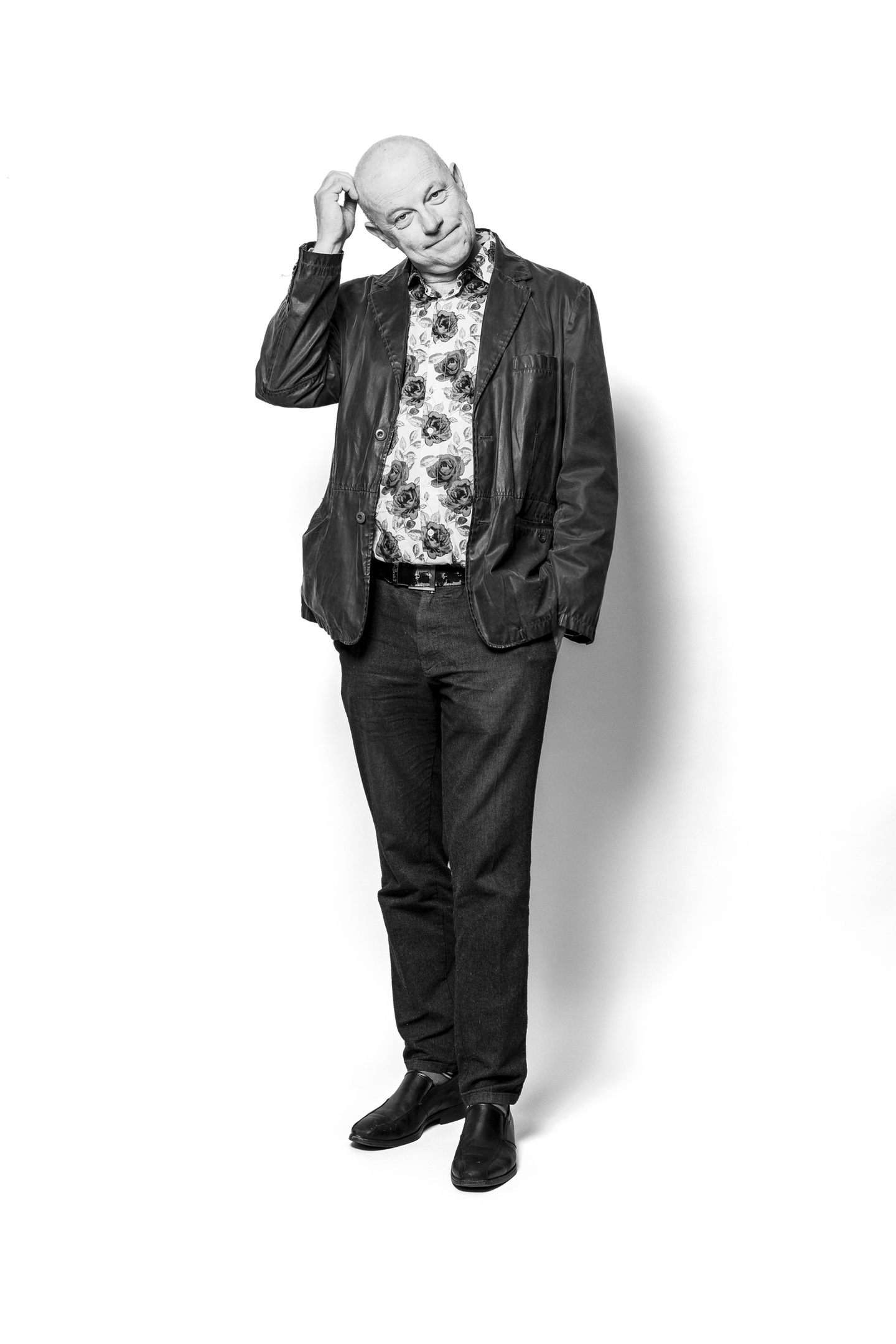news media
Excellence in journalism
It’s never the primary goal, but sometimes great journalism is recognised with a prize. Gep Leeflang (de Stentor), Maarten Keulemans (de Volkskrant) and Robin Ramaekers (VTM Nieuws) were all lauded for their work last year. We talked to them about perseverance, their work ethic and the sacred duty of journalism.
Winner of the Saskia Stuiveling Prize
GEP LEEFLANG (DE STENTOR):
“You have to follow your instincts as a journalist”
Like getting a perfect 10 out of 10 on his report card, something he never expected to get – that’s how Gep Leeflang (57) felt when he won the Saskia Stuiveling Prize for Best Regional Political Journalism. A reporter for de Stentor, the regional newspaper in the eastern part of the Netherlands, Leeflang received the award in March 2022 for a series of nearly 100 articles on public corruption in the municipality of Epe. The jury praised Leeflang for his “intrepid and tenacious” investigative work and articles, and for single-handedly exposing questionable deals despite firm opposition from local administrators.
Read more


Journalist of the Year
MAARTEN KEULEMANS
(DE VOLKSKRANT):
“You have to separate fact from fiction”
It’s nice to have a science journalist in the spotlight for once, says Maarten Keulemans (54) of de Volkskrant. In January 2022, he was named Journalist of the Year in the Netherlands for his ‘tireless reporting’ on the coronavirus pandemic. “Usually, awards like these go to political reporters who break a big story,” says Keulemans. “As a science journalist, I mainly wrote pieces for the back pages. That changed during Covid.”
Read more
AIB Award nominee
ROBIN RAMAEKERS (VTM):
“Keep telling stories about anonymous heroes”
He didn’t end up winning, but Robin Ramaekers (48) says it was an honour just to be nominated for the Association for International Broadcasting’s AIB Awards, also known as the ‘Oscars of journalism’. Especially since his fellow nominees worked for global players like CNN, BBC and Al Jazeera. The Flemish TV journalist, who previously earned a nomination in 2019 for his reporting from Yemen, received a nod again last year for a series of reports for VTM Nieuws on the war in Ukraine.
Read more

Winner of the Saskia Stuiveling Prize
GEP LEEFLANG (DE STENTOR):
“You have to follow your instincts as a journalist”
Like getting a perfect 10 out of 10 on his report card, something he never expected to get – that’s how Gep Leeflang (57) felt when he won the Saskia Stuiveling Prize for Best Regional Political Journalism. A reporter for de Stentor, the regional newspaper in the eastern part of the Netherlands, Leeflang received the award in March 2022 for a series of nearly 100 articles on public corruption in the municipality of Epe. The jury praised Leeflang for his “intrepid and tenacious” investigative work and articles, and for single-handedly exposing questionable deals despite firm opposition from local administrators.
Leeflang sees himself as a regional watchdog – one that’s not just there to wag his tail during happy events, but one that also growls and barks, and that won’t let go once he sinks his teeth into something. It all started innocently enough, with an alderman handing out permits without going through the proper channels. Leeflang got to the bottom of the story, and his reporting caused a political crisis that led to the resignation of two aldermen. But for Leeflang, the more important outcome was that he managed to expose abuse of power in local politics. “You see a municipality that’s at odds with its own community and that’s trying to win legal battles instead of generously involving local residents in issues.”
Leeflang considers the Saskia Stuiveling Prize an enormous honour, and he sees it as a sign of encouragement. Because like every other newspaper, de Stentor also feels the pressure to fill its pages every day, which can sometimes come at the cost of thorough and sustained investigative journalism. The trick is to do both. “I also end up chasing the story of the day sometimes,” Leeflang says. “But when you find a story that smacks of corruption, you have to show guts, be stubborn and follow your instincts as a journalist by diving in. Even if it takes countless hours of research and a lot of perseverance. In my case, the investigative work I did yielded a large number of articles for the daily newspaper. In a way, I created my own work.”
Besides the appreciation of his editors and colleagues, promises to do better from public officials and the observation that regional journalism is alive and well, the award also brought Leeflang something else: “I think administrators are now thoroughly aware they can’t pull the wool over my eyes.”
Journalist of the Year
MAARTEN KEULEMANS (DE VOLKSKRANT):
“You have to separate fact from fiction”
I
t’s nice to have a science journalist in the spotlight for once, says Maarten Keulemans (54) of de Volkskrant. In January 2022, he was named Journalist of the Year in the Netherlands for his ‘tireless reporting’ on the coronavirus pandemic. “Usually, awards like these go to political reporters who break a big story,” says Keulemans. “As a science journalist, I mainly wrote pieces for the back pages. That changed during Covid.”
So Keulemans, a self-proclaimed ‘geek’, basked in the limelight, considering it a great honour. He sees it as his sacred duty as a journalist to keep the public well informed – especially in uncertain times. “There came a point where some readers started turning away from the mainstream media, which they viewed as defenders of the establishment. Subscribers no longer believed what was in the paper. That’s when it’s even more important to separate fact from fiction, to explain what the scientific consensus is and where there’s doubt and uncertainty.”
Keulemans’ commitment to the truth earned him high praise from the jury, as did his series of columns, ‘Keulemans in quarantine’, in which he answered readers’ questions about Covid and other topics. His efforts to engage in discussions with his readers, also on Twitter, were lauded as well. “I don’t represent de Volkskrant on Twitter, and it’s something I do in my spare time,” says Keulemans. “But I do enjoy using Twitter as another platform to explain scientific studies and debunk nonsense.”
As Journalist of the Year, he is occasionally treated with a little more respect (“You’re not just anyone,” one researcher told him), but what remains unchanged is his drive to explain complicated subjects in an approachable way. “It’s a common pitfall in journalism to assume that readers already know something because you’ve written about it before. You just need to explain things in simple terms. My way of working hasn’t changed. Now that the pandemic is on its last legs, I’m just as happy diving back into scientific studies and articles on things like climate change. That’s also great fun.”
AIB Award nominee
ROBIN RAMAEKERS (VTM):
“Keep telling stories about anonymous heroes”
H
e didn’t end up winning, but Robin Ramaekers (48) says it was an honour just to be nominated for the Association for International Broadcasting’s AIB Awards, also known as the ‘Oscars of journalism’. Especially since his fellow nominees worked for global players like CNN, BBC and Al Jazeera. The Flemish TV journalist, who previously earned a nomination in 2019 for his reporting from Yemen, received a nod again last year for a series of reports for VTM Nieuws on the war in Ukraine.
To be more precise, he reported from Mykolaiv, just after the city had suffered heavy bombing. “In Mykolaiv, we were the only outlet reporting from an army base that had just been bombed in an attack that likely killed over 200 recruits. We were able to put a face to the war every day with unique stories, including one about a postwoman who continued to deliver cash pension payments to local residents in bomb shelters and flats amid all the attacks and violence. We were in the right place at the right time,” says Ramaekers, whose reports were picked up by outlets including the BBC, ITV and the NOS.
Coincidence does play a role, says Ramaekers, but only to an extent. “Sometimes the puzzle pieces all fall into place, but that’s preceded by a lot of groundwork: figuring out where to get the best story and constantly being highly aware of the context in which you’re operating. But there are also days where you’re just very frustrated, because the warring parties will often make a conscious effort to obstruct your work, simply because the story you want to bring doesn’t fit their desired narrative.”
As a war reporter, Ramaekers sometimes works in areas struck by rockets just moments before. Yet he doesn’t think of himself as ‘fearless’. “That suggests a certain hubris, and we know our limitations. But I do have a great deal of curiosity. I’m under no illusion that our reporting is going to make a big difference. Still, I think it’s incredibly important to keep telling the stories from this war, to keep feeling empathy for the ordinary people caught up in it, like the modest anonymous heroes who, despite everything, continue delivering the mail.”
Ramaekers sees his nomination mainly as encouragement. “Obviously, I would’ve loved to win the award, but I also see it as an incentive to do even better reporting this year.”